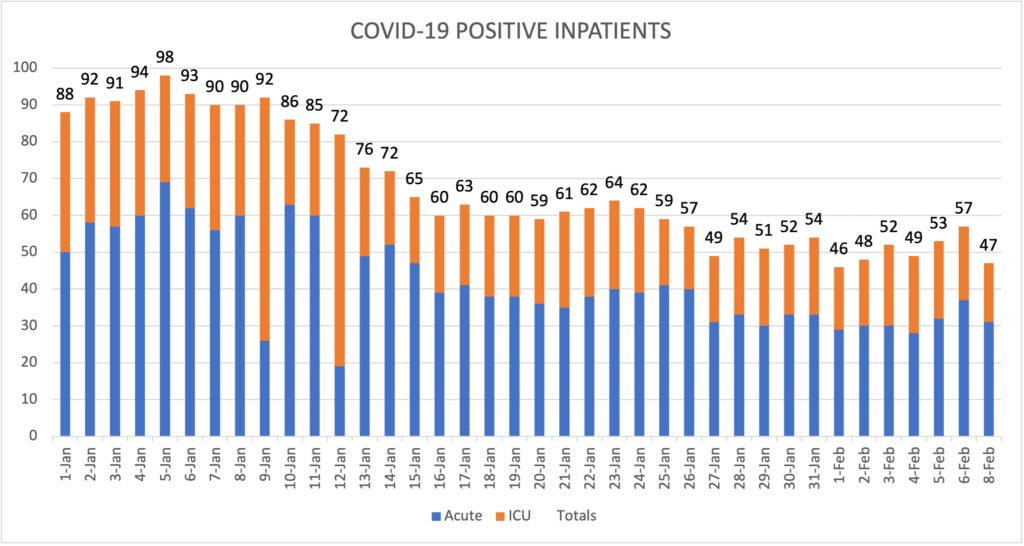Data Snapshot
UW Medicine Hospitals:

King County: The county reported 177 new positive cases and 0 new deaths on Feb. 8.
Washington: The state reported 307,189 cases and 4,451 deaths as of Feb. 7.
United States: The CDC reports 26,852,809 cases and 462,037 deaths as of Feb. 8.
Global: WHO reports 106,125,682 confirmed COVID-19 cases and 2,320,497 deaths as of Feb. 9.
Numbers update frequently, please follow links for most up-to-date numbers.
UW Medicine COVID-19 Vaccine Distribution Update
Total Vaccine Doses Administered: 68,841
- Total first dose: 51,372
- Total second dose: 17,469
As of Feb. 4, 2021.
COVID-19 Literature Report
COVID-19 Literature Situation Report is a daily (M-F) newsletter put together by the Alliance for Pandemic Preparedness that provides a succinct summary of the latest scientific literature related to the COVID-19 pandemic.
Key Takeaways: COVID-19 Literature Situation Report Feb. 8, 2021
- Sequencing of SARS-CoV-2 genomes collected from testing facilities in the U.S. between December 2020 to January 2021 found multiple independent introductions of the B.1.1.7 variant into the U.S. by late November 2020, with community transmission leadings to its spread to 30 or more states as of January 2021. More.
- A systematic review and meta-analysis of remdesivir for the treatment of COVID-19 showed significant improvement in the 28-day recovery rate, need for low flow oxygen support through day 14, and mechanical ventilation or extracorporeal membrane oxygenation requirement through 14-28 days of follow-up among those receiving remdesivir. More.
- A study using a live virus neutralization assay to compare potency of neutralization between people who had been infected with SARS-CoV-2 or had received the Moderna COVID-19 vaccine against a panel of SARS-CoV-2 variants showed that antibodies in sera from both groups were effective at neutralizing the B.1.1.7 variant. More.
- Among healthcare workers who received a single dose of the Pfizer/BioNTech vaccine, those who had SARS-CoV-2 infection 30-60 days prior to vaccination (n = 36) had significantly higher antibody levels at 3 weeks post-vaccination than individuals with no prior infection (n = 152). More.
COVID-19 Literature Surveillance Team, is an affiliated group of medical students, PhDs and physicians keeping up with the latest research on SARS-CoV-2 / COVID-19 by finding the newest articles, reading them, grading their level of evidence and bringing you the bottom line.
Read the latest report: Feb. 8 | Daily COVID-19 LST Report.
Listen to the latest podcast: Feb. 1 | COVID-19 LST Podcast.
UW Medicine in the News
The Seattle Times: Washington’s hospitals send N95 masks to 3M for testing and discover many are knockoffs
Featuring: UW Medicine
Dozens of Washington hospitals have learned that N95 respirator masks believed to be purchased from 3M are knockoffs and were not manufactured by the company. After receiving notice from 3M about the possibility that some masks were counterfeit, the Washington State Hospital Association (WSHA) on Friday alerted the state’s hospitals and asked them to pull potentially affected masks from their supplies. WSHA asked the state’s 115 hospitals to sort through their mask supplies and several have sent masks to 3M for testing. On Saturday, the company confirmed that some were counterfeit, the hospital association announced Sunday. WSHA officials said they’re unsure how 3M originally discovered the fraud. And it’s unclear where the masks originated or how many masks are fakes, because hospitals around the state are still sending samples in for testing. But the issue affects the supply of somewhere between hundreds of thousands to more than a million N95 masks, said Cassie Sauer, president and CEO of WSHA.
Read more on the N95 respirator update from John Lynch, MD, and Seth Cohen, MD.
KIRO 7: UW Medicine scientists seek COVID-19 ‘long-haulers’
Featuring: Kelli O’Laughlin, MD, MPH, FACEP, Emergency Medicine
“Scientists at UW Medicine are looking for your help to study COVID-19 symptoms. The study includes long-haulers—people who have symptoms that persist long after getting sick. Right now, there’s a big gap in information about why this happens for some people and how many. UW Medicine is part of a nationwide study called INSPIRE, and they’re looking for anyone who has tested positive in the last 28 days to sign up and join this 2-year study. It’s all online. You just need to take a 30-minute survey every three months. ‘The thing that stands out the most is just the profound long-term impact this can have on people’s lives in terms of loss of normal physical function and inability to do what they would normally in their life,’ said Dr. Kelli O’Laughlin. ‘We think it’s very important to answer who is affected by COVID-19 and in what ways they’re affected, so we can better get to why.’”
Eat This, Not That!: It’s Still Not Safe to Go Here, Say Infectious Disease Doctors
Featuring: Paul Pottinger, MD, DTM&H, Allergy & Infectious Diseases
“Dr. Paul Pottinger, a professor of infectious disease at the University of Washington, told The News Tribune that he is “nervous” about restaurants reopening. “My overall philosophy is: Yes, of course it can be done safely. The question is whether it will be,” he explained. ‘At this point, we have plenty of information about how it is spread to be able to say, ‘These are the core elements of a safe experience,’ he said, pointing to masks, properly circulating air, and social distancing measures keeping you away from those who don’t live in your household. ‘The virus doesn’t care how hungry you are. The virus doesn’t care how much you want to see your friends. It simply waits for us to make a mistake with those core elements.’”
Tweet of the Week
This week and next, our state is expecting 207k vaccine doses. Week of Feb. 21, that number jumps to more than 240k doses. And by end of February, Johnson&Johnson vaccine could be authorized — something Keith Jerome @UWVirology is happy about. @komonews https://t.co/t3eVnT8Vif
— UW Medicine Newsroom (@uwmnewsroom) February 8, 2021

